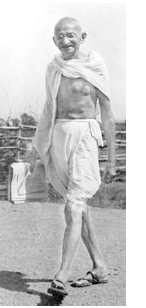Mahatma Gandhi’s School Days

Born Mohandas Gandhi (1869–1948), and later popularly referred to as the ‘Mahatma’ or ‘great soul’, Gandhi became a national hero in the Indian struggle to secure the independence of India from the British Empire. His philosophies of truth and non-violent resistance have inspired many political movements since, and had their roots in traditional Hindu religious beliefs. Despite his greatness as a political leader, Gandhi remained a modest man. ‘I have nothing new to teach the world,’ he once said. ‘Truth and non-violence are as old as the hills.’ Following is a description of an incident from his schooldays in an English-language school in colonial India.
Describing an incident from his school days in South Africa, Mahatma Gandhi illustrates one of the moral aspects of didactic teaching—the importance of getting ‘right’ answers.
There was an incident which occurred at the examination during my first year at the high school and which is worth recording. Mr Giles, the Educational Inspector, had come on a visit of inspection. He had set us five words to write in a spelling exercise. One of the words was ‘kettle’. I had mis-spelt it. The teacher tried to prompt me with the point of his boot, but I would not be prompted. It was beyond me to see that he wanted me to copy the spelling from my neighbour’s slate, for I had thought that the teacher was there to supervise against copying. The result was that all boys, except myself, were found to have spelt every word correctly. Only I had been stupid. The teacher tried later to bring this stupidity home to me, but without effect. I never could learn the art of ‘copying’.
Yet the incident did not in the least diminish my respect for my teacher. I was by nature blind to the faults of elders. Later I came to know many other failings of this teacher, but my regard for him remained the same. For I learnt to carry out the orders of elders, not scan their actions.
Gandhi, Mahatma. 1949. Gandhi, An Autobiography. London: Phoenix Press. pp. 5–6. || Amazon || WorldCat
